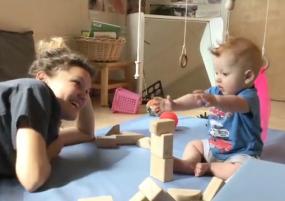How Laughter Frames the Constructive Side of Work

Beckett has been at school for 2.5 months. Ashley has been his teacher for 2 weeks. Ashley engages Beckett in a game of building blocks and letting Beckett make them fall over. Ashley participates in the game by making sounds of surprise and laughter at each falling over. Ashley is quick to stack the blocks as Beckett moves to knock them over. Around 00:59 Beckett gazes at Ashley, awaiting her laugh. When it comes he laughs as well. At this point the rule of the game is, “let’s laugh together.” Around 01:29 we notice that Beckett looks at Ashley as he touches the blocks as if he knows what will make her laugh. The game now has the rule: “I will take the blocks apart, and you and I will laugh.” As teachers we appreciate that children increase the complexity of a game, a testament to their high-level thinking. Around 01:31 it looks like Beckett tries to get Ashley to laugh in another way, by holding a block and dropping it abruptly. Perhaps he wants to know, “Will this action make her laugh too?”
Why doesn’t Beckett laugh when Ashley stacks the blocks? Is it because Ashley did not make her sound of surprise when he did so? So why did Ashley decide to make her sound when the blocks fell down? Adults have a way of helping children learn the difference between “doing” and “undoing.” In another culture stacking the blocks could be treated as undoing the blocks scattered on the floor. A lot is going on during these ordinary encounters between child and adult, such as how to frame the two sides of work. Which side is productive and which side is counter-productive and deserves an “uh oh” or “oops” from the adult? Could knocking the blocks over ever be considered the productive side of work? A common thread holds that Ashley and Beckett are expressing their shared joy and thereby building a positive relationship of fun and trust. To support their engagement we notice that Ashley remains at Beckett’s level so she can easily make eye contact with him. All and all this little encounter has much value, don’t you think?
Length of video: 2 minutes 52 seconds
Keywords: infants, blocks, child-teacher, games, social engagement, teaching
